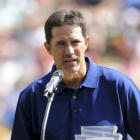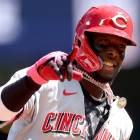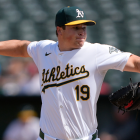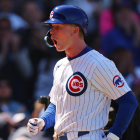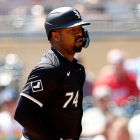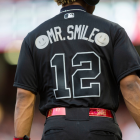The 2017 Baseball Hall of Fame class will be announced on Jan. 18. We're using the interim period to examine each of the 34 candidates on the BBWAA ballot. Remember that a player must be named on at least 75 percent of submitted ballots to be enshrined into Cooperstown.
If you're tuning in late, we've already poked at the candidates who will be removed from the ballot after one season. Recently, we've turned our attention to the players earning serious consideration -- and determining whether they merit entry into the Hall or not.
Today, it's Mike Mussina's turn.
Mussina broke onto the ballot in 2014, earning 20.3 percent of the vote. That number has since increased with each successive year, to 24.6 percent in 2015, then to 43 percent in 2016. The trend remains true so far this voting season, as Mussina has been named on 61 percent of public and anonymous ballots -- though that percentage will drop, perhaps by as much as seven percentage points (as it did last year), when private ballots are considered.
The case for Mussina
The argument for Mussina is that he was a high-quality pitcher for nearly two decades. He started 536 games over parts of 18 seasons, compiling more than 3,560 innings. He won 270 games and posted a 3.68 ERA -- or a 123 ERA+, which is the more telling metric given he spent his career in the American League East, pitching in hitter-friendly ballparks. Additionally, Mussina made five All-Star teams; won seven Gold Gloves; finished top-six in Cy Young Award voting; and performed better (per ERA and strikeout-to-walk ratio) in the postseason than not.
The case against Mussina
The argument against Mussina is that he was more of a compiler than an impacter -- or, in so many words, he wasn't a Randy Johnson, a Pedro Martinez, or even a Roger Clemens. Okay, fine; not every newsletter writer is Helena Fitzgerald -- that doesn't mean everyone else is worthless. But while Mussina never led the AL in ERA+ during any given season, he did finish in the top-five seven times. He led the AL in wins in 1995, and finished second on three other occasions. He also ranked first in WAR for pitchers in 2001, and was to-three three other times.
Besides, the compiler tag doesn't make sense to apply to Mussina -- especially since how it's often stamped on players who hang around to chase counting-stat milestones. Mussina did not do that. Mussina did pitch worse late in his career early on -- true of most everyone -- yet he finished with an ERA+ below 100 just three times ... and only once, in his penultimate season, did his ERA+ dip below 93, or roughly that of a league-average starter. Look at Mussina's WAR output and the ratio of good-to-great seasons remains the same: he finished with three-plus WAR in all but four of his seasons, and one of those was his rookie year. Only once, that 2007 season, did he finish with fewer than two wins above replacement.
Predictably, given Mussina was at least an above-average starter for close to two decades, he boasts some impressive all-time ranks. Among the 290 pitchers with more than 300 career starts, Mussina has the 19th-most WAR; the 24th-most wins (and the 14th-best winning percentage); and the 35th-best ERA+. You can put together a convincing case that he's one of the top-25 or so pitchers of all-time -- and he did it during the steroid era.
Will he make it?
Does Mussina deserve enshrinement? Absolutely. He's better than the baseline of the pitchers already in the Hall of Fame, and his quantity of quality seasons should help obscure that he was never undoubtedly the best pitcher in any given season. Small-Hall voters might object, but Mussina will get in eventually -- just not this year.
Other Hall of Fame cases: Posada | Ramirez | Guerrero | Rodriguez | Sosa | Wagner | Walker | Sheffield | Kent | Smith













